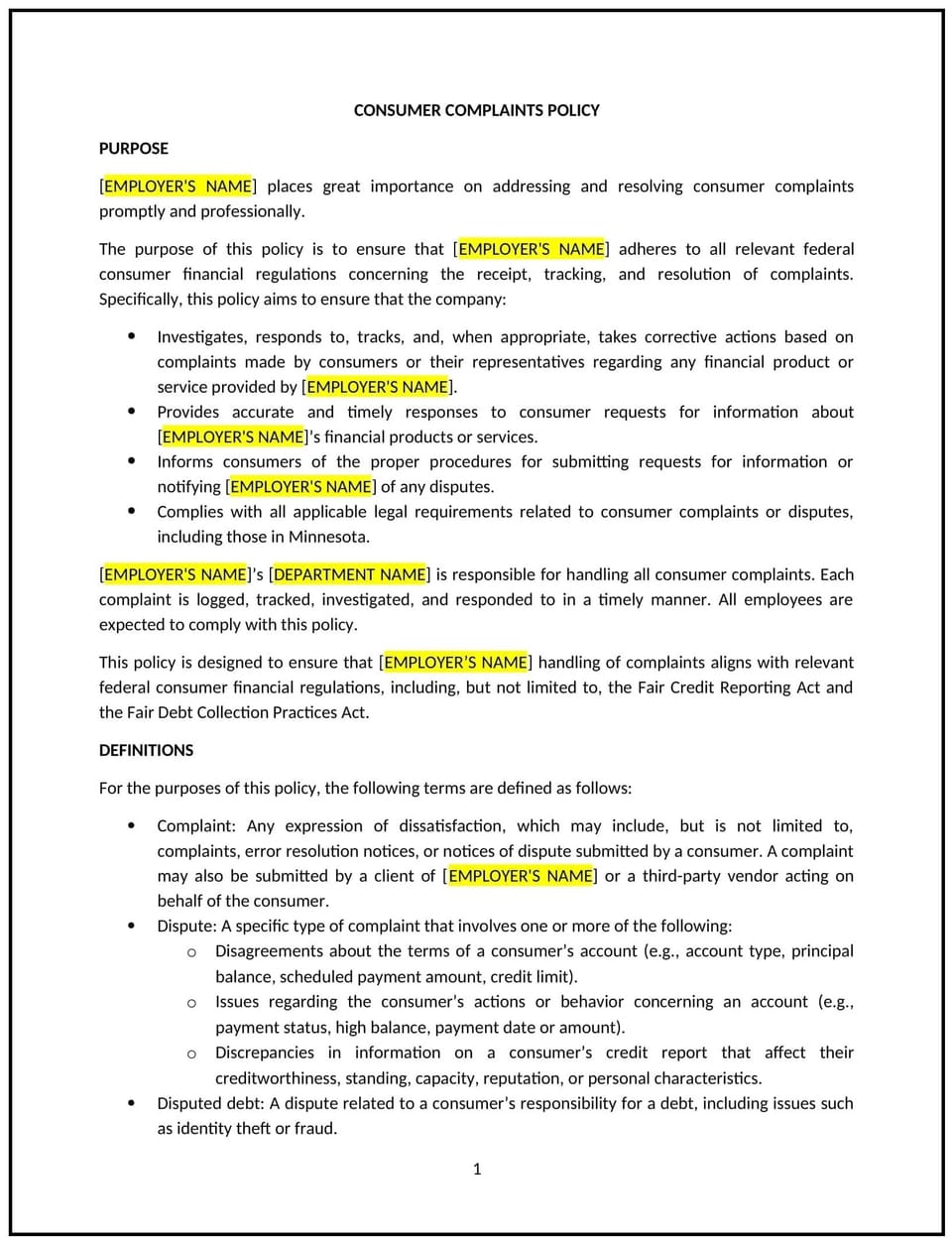Consumer complaints policy (Minnesota): Free template

Consumer complaints policy (Minnesota)
This consumer complaints policy is designed to help Minnesota businesses effectively manage and address consumer complaints. It outlines the process for consumers to file complaints, the steps the business will take to resolve issues, and the expected timelines for responding to complaints. By implementing this policy, businesses can enhance customer satisfaction, resolve disputes efficiently, and foster positive consumer relationships.
How to use this consumer complaints policy (Minnesota)
- Define the scope of complaints: Specify the types of complaints covered under the policy, including product defects, service issues, billing discrepancies, and poor customer service.
- Set clear reporting procedures: Outline how consumers can file complaints, whether through an online form, email, phone, or in-person, and provide contact information for customer service teams.
- Establish response timelines: Define the expected response time for acknowledging and addressing consumer complaints, ensuring timely resolution.
- Define resolution steps: Detail the process for investigating and resolving complaints, including steps for gathering information, communicating with consumers, and offering solutions or compensation.
- Protect consumer privacy: Ensure that any personal or sensitive information shared by consumers in complaints is handled confidentially and in accordance with data protection laws.
- Provide feedback and follow-up: Outline how consumers will be informed of the outcome of their complaint and any actions taken to prevent future issues.
Benefits of using a consumer complaints policy (Minnesota)
Implementing this policy provides several advantages for Minnesota businesses:
- Enhances customer satisfaction: By addressing complaints promptly and effectively, businesses can improve customer loyalty and retention.
- Reduces negative impact: Resolving complaints quickly can minimize the risk of negative reviews, social media backlash, or legal action.
- Increases operational efficiency: A structured process for handling complaints streamlines the resolution process and ensures consistency in addressing issues.
- Fosters positive consumer relationships: Demonstrating a commitment to addressing consumer concerns helps build trust and enhance the company’s reputation.
- Reflects Minnesota-specific considerations: Tailors the policy to local consumer rights and expectations, aligning with state laws and business practices.
Tips for using this consumer complaints policy (Minnesota)
- Communicate clearly: Ensure that all employees, especially customer service representatives, understand the policy and can assist consumers in filing complaints.
- Train staff: Provide training on how to handle complaints professionally, empathize with consumers, and resolve issues effectively.
- Document complaints: Maintain a record of all complaints, including the nature of the complaint, actions taken, and outcomes, for future reference and process improvement.
- Continuously improve: Use feedback from complaints to identify patterns and improve products, services, or customer service practices.
- Review regularly: Reassess the policy periodically to ensure it meets evolving business needs and Minnesota-specific regulations.
Q: What types of complaints can consumers file under this policy?
A: Consumers can file complaints related to products, services, billing, customer service, or any other issue that affects their experience with the business.
Q: How can consumers file a complaint?
A: Businesses should provide multiple channels for filing complaints, such as an online form, customer service phone line, email address, or in-person visits.
Q: How quickly should businesses respond to complaints?
A: Businesses should acknowledge consumer complaints within 24 to 48 hours and provide an initial response outlining the steps that will be taken to resolve the issue.
Q: What steps should businesses take to resolve complaints?
A: Businesses should investigate the complaint thoroughly, communicate with the consumer, and offer appropriate solutions, such as replacements, refunds, or discounts, depending on the issue.
Q: How will businesses keep consumers informed during the complaint resolution process?
A: Businesses should provide regular updates on the status of the complaint and inform the consumer once the issue has been resolved or an outcome has been reached.
Q: Are businesses required to maintain confidentiality when handling complaints?
A: Yes, businesses should ensure that all personal and sensitive information shared in complaints is handled confidentially and in accordance with privacy regulations.
Q: How often should this policy be reviewed?
A: The policy should be reviewed annually or when changes occur in consumer rights, business operations, or Minnesota-specific regulations.
This article contains general legal information and does not contain legal advice. Cobrief is not a law firm or a substitute for an attorney or law firm. The law is complex and changes often. For legal advice, please ask a lawyer.


